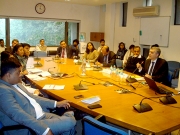The World Bank's India Development Update 2015: Fiscal Policy for Equitable Growth
30 Nov 2015
Past Event

NCAER organised a seminar by Dr Frederico Gil Sander to discuss the World Bank’s recently released India Development Update 2015: Fiscal Policy for Equitable Growth.
Dr Sander, World Bank’s Senior Country Economist presented an overview on the report which projects that India’s GDP will grow by 7.5 percent in FY2015-16 and by 7.8 and 7.9 percent in the next two fiscal years. The dramatic decline in crude oil prices since 2014 has played an important role in driving this favourable economic outlook. He spoke on the extent to which India reaped the benefits of this oil price bonanza and its implications for growth prospects. The fall in oil prices helped through decline in inflation, reducing fuel subsidies and narrowing current account deficit. The resulting fiscal consolidation created space to increase capital spending on infrastructure especially roads and for RBI to cut policy rates to boost investments. However, global economic conditions remain uncertain and key structural reforms are necessary to maintain pace of growth. Fiscal policy reforms, in particular GST and devolution of funds to states in 14th Finance Commission would further help in transforming India to a single market and enhance capacity of state and local governments to deliver better public services.
Joining the seminar as a discussant, Dr Pinaki Chakraborty, Professor, NIPFP presented his views on implementation of GST bill and recommendations of 14th Finance Commission, specifically problems with making GST tax rate of 18% constitutional, origin based 1% additional tax and leaving petroleum out from perview of GST given its huge cascading effect. He also recommended relooking at all Centrally Sponsored Schemes and reorganizing them into core and non-core based on top national priorities.
Dr. Anusha from NCAER highlighted that although growth projections are optimistic, it is important to estimate the magnitude of output gap more carefully given low capacity utilization and slowdown in investments. Dr Bornali Bhandari from NCAER, while agreeing with the overall outlook, commented on the lack of discussion on agriculture; not emphasising enough the role non-performing assets in the banking sector, which was restricting the public sector banks in passing on the lower interest rate to customers; high inflationary expectations and; mixed services outlook.
About Dr Frederico Gil Sander
He is the World Bank’s Senior Country Economist based in New Delhi. He was most recently the Bank’s Senior Country Economist for Malaysia and has worked on macro and debt management for Thailand, Laos, Cambodia, and Myanmar, and on debt relief for low-income countries. Before joining the Bank he worked on emerging market debt & capital markets at the New York firm of Bear Stearns. Sander has a PhD in Political Economy from Princeton’s Woodrow Wilson School.










